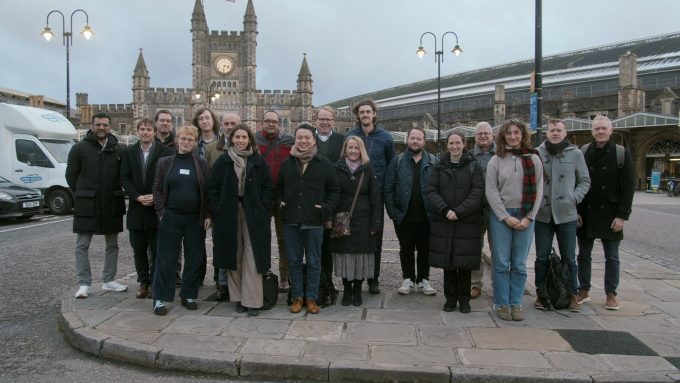
Meet the Academic urging creative delivery in the procurement of rail projects

Why persevere with outdated processes if they don’t lead to desired outcomes? When it comes to infrastructure delivery, one senior academic says more emphasis should be placed on investigating new approaches that work – and replicating them on future schemes.
Ian Heptinstall spent much of his career in building services, pharmaceutical and chemical industries; overseeing projects and managing budgets. Five years ago, he switched from business to academia; becoming an Associate Professor in Project Management at the University of Birmingham, providing insight to the next generation crafting the urban realm.
This summer, Ian embarked on an 18-month placement as a Researcher in Residence with Connected Places Catapult to explore ways of overcoming project management and procurement obstacles to technical innovation in the rail sector, and encourage new thinking. His grant funded study is aligned with the Station Innovation Zone at Bristol Temple Meads, and the Innovation Procurement Empowerment Centre (IPEC), delivered in partnership with both the universities of Birmingham and Manchester.
“There's some great people at Connected Places Catapult who are keen to make a difference,” he says. “It's also fascinating to see the range of activities under the Catapult umbrella, such as IPEC, its work to help local authorities, and growing engagement with the rail sector through initiatives like the Station Innovation Zone.”
“The funding will give me time to conduct research, and this is a great opportunity for a late career researcher like me. I’m not an academic who's taken a conventional path.”Ian Heptinstall, Associate Professor in Project Management at the University of Birmingham
Aiming to achieve more by doing less
Ian recognises that society has set itself many important challenges for the next 30 years – such as reaching net zero – but says “if we're going to stand a chance of achieving them, we will struggle if we deliver projects in ways done in the past”.
For businesses there is, he adds, an “opportunity to do more for less” and he asks why the UK is “not doing more of the things that seem to work”.
Ian points to certain procurement practices on projects as a problem; especially those that create win/lose relationships, or foster a lack of teamwork. All too often teams will focus on their “narrow domains, or areas of speciality”, and less on “bringing systems together as a whole”.
In short, there is an assumption that on large projects “the jigsaw pieces will put themselves together”, whereas in reality “many of the pieces are from the wrong jigsaw, so will not self-assemble”.
Over his career, Ian has observed what seems to be a downplaying or an under estimation of the important role of a project manager. “Instead, there is a local focus on achieving efficiencies which can actually harm the overarching project,” he says.
“My view is we're all trying very hard to improve the performance, value, societal benefit and return on investment of large projects, but are still struggling like previous generations did for decades.
“The question is: do we really understand how projects work and how best to manage them and the procurement needed to maximise their benefit?”

Procurement in focus for better decision making
Ian says taxpayer money is often wasted on inefficient practices, and there is often a belief that megaprojects always fail. But there are hundreds of billions of dollars’ worth of projects that have shown that new thinking can deliver results.
He is particularly interested in the role of procurement to encourage better decision making, and says there are several new approaches to collaboration that may be considered niche, but are worthy of testing.
“I just don't see debates happening,” he laments. “Instead, there is an assumption we're doing as well as we can. I understand the importance of having positive thoughts, but we also need some realism and embrace a sense of ‘constructive dissatisfaction’.”
Ian explains there is value in being dissatisfied with the status quo, but with the belief that things can get better. “Very often dissatisfaction is seen as negative and destructive, and people urge you to ‘stop being a whinger’. But this isn’t whinging: it’s about wanting to get better.”
Starting out in the chemicals industry
Ian grew up in Lancashire and Derbyshire, and spent his teenage years in Buxton “riding and tinkering with bicycles”. After his A-levels, Ian went to work in a chemicals factory as a sponsored student with ICI in Huddersfield, which supported him through a four-year engineering degree.
“It was a great way to learn, but sadly we see less of this sort of course now. Large employers seem to want to recruit perfectly formed professionals.”
He joined the company full time as a development manager, running small manufacturing projects, and stayed for 15 years. Highlights included producing chemical products in France and maintaining the company’s engineering facilities. More broadly he developed his skills in project management, became a purchasing manager and later a business development manager.
Ian was involved in the early stages of designing a biodegradable plastic product made from corn starch, and got involved in collaborative contracting with a client to deliver equipment upgrades.
Around the turn of the Millennium, he joined pharmaceutical giant GlaxoSmithKline (now known as GSK) in an engineering procurement role, and delivered commercial training to hundreds of colleagues. Ian then spent two years as a management consultant before starting work for building services firm NG Bailey as head of procurement and later supply chain director.
He later joined a procurement consultant in the Middle East and Switzerland delivering training and development, and worked in collaboration with the Chartered Institute of Purchasing & Supply, before writing a book on project management.

Moving across to academia
Ian decided to make the switch to academia to “help the next generation learn from the experience and mistakes I've made – and my generation has made”.
He was concerned that not having a PhD to his name may have been a barrier to becoming a lecturer in project management, but was heartened to hear the University of Birmingham was looking for someone with practical experience to help review the current course syllabus and make recommendations.
Today he delivers a distance learning Masters programme in industrial project management, which includes a look at procurement. He has also begun his own path to achieving a PhD “to add structure to my own research capabilities”.
Ian says a marker of success for him would be to see those running large organisations become better at “questioning and critically assessing how things are being done, and running experiments aimed at trying to continuously improve”.
He adds the rail sector would benefit from having a larger number of companies involved in delivery, to create “diversity and many different ideas”.
“I would like to think this would make a more enjoyable, valuable and comfortable way of getting around for passengers,” Ian says. “The more diverse the pool of firms we consider, the more chance of finding improved solutions.”
For him personally, he is keen to continue offering his input to the sector for as long as possible. “I'd like to think my work is valued. So long as it is appreciated, I'll keep contributing.”
Ian Heptinstall’s placement is funded by the Innovation Launchpad Network+, an EPSRC-funded project which focuses on bringing together leading universities and the Catapult Network.
Find out about our latest Researchers in Residence scheme. To be alerted about opportunities at Connected Places Catapult, join our Academic Network.
To hear about the Innovation Procurement Empowerment Centre – which aims to promote growth and regional renewal through smarter spending – visit ipec.org.uk
Listen to a podcast about the Station Innovation Zone at Bristol Temple Meads.





